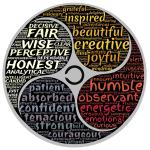Have you heard of the six degrees of separation theory?
A quick definition . . .
Six degrees of separation is the idea that all people are six or fewer social connections away from each other.
This also applies to being separated by six degrees of greatness; to people of notoriety or fame.
Theories are nothing unless they can be proved, though, and I can verify that in my life this theory has been proven truthful.
Famous people I’ve met
When I was eight, I was traveling with my family on a flight, and we spotted Glen Campbell sitting in coach a few rows up from us. We coaxed my sister into getting his autograph. She was five and cute as a button, we knew Glen couldn’t turn her down. I have no clue where that autograph went.
Technically speaking, I didn’t meet Glen, but my sister did, which means I was two degrees away from knowing someone great.
When I was eighteen, I left home and took a Greyhound bus to Del Mar, California. I became a professional skater there and worked at a skatepark under the manager J. Grant Brittain. Grant would later become THE most well-known and respected skateboarding photographer to date. In his 40 plus year career he as rubbed shoulders with many of the best skaters and iconic figures in this sport.
I met Charlie Daniels one afternoon when he walked into my music store to buy a thumb pick. He was in Alaska fishing for reds (salmon) and was headlining the county fair north of Anchorage. We chatted for ten minutes—and no—I didn’t get a selfie or his autograph. Didn’t feel the need to bother him about it.
Mark Hallman, a singer songwriter, and renowned music producer mastered two of my music CD’s. He’s produced music for Capitol records, Carol King, and a slew of other famous musicians—of which I am not worthy enough to include myself. Still, it was great to meet Mark at the Congress House Studios in Austin and to have his expertise on my own musical projects.
I also met Jake Shimabukuro after a concert he performed. He’s undoubtedly the best-known ukulele player in the world. I brought with me an extra ukulele I had hanging in my store, and he was happy to sign it Aloha Jake!
And so it goes . . . Everyone is separated by greatness within six degrees or less.
There’s just one thing wrong with this theory: we all have the potential to be great.
What’s it take to be great? Opinions vary . . .
We all have differing opinions on what it takes to be great, and I’m guessing our opinions are based on these general factors:
Firstly, there are people who simply don’t care about being great. And that’s okay! The majority of people in the world could care less about becoming either great or famous. They just want to live a normal, happy and worthwhile life.
The irony is some of these individuals will achieve notoriety by a stroke of luck.
Secondly, we’re apt to have great advice on what it takes to be great because we are already great. We know this because people tell us we’re great. We’re either very talented, brilliant, or very good at something. In which case, we know what we did to become great, and our advice to others would be to do exactly what we did to succeed.
The irony here is that there are a lot of talented and brilliant people out there who follow the pathway of others who have achieved greatness, but they will never achieve greatness.
Thirdly, we think we’re great but nobody else does! In which case, we’re either full of ourselves or fooling ourselves.
This is a two-pronged assessment, however. For there’s nothing wrong with thinking we’re great even though people don’t recognize our achievements. This can be a healthy perspective for us to have about ourselves.
Problems can arise, however, when we overestimate our own magnificence. And we can become resentful towards others who fail to recognize how great we think we are.
I’m a firm believer that my final opinion on what makes people great is the most realistic: There is no clear formula or set of rules that ensures people will become great. Achieving greatness is a fluke. A stroke of luck. A fortuitous convergence of random events. A whim of the gods.
Let’s face it, in today’s world greatness is more easily gifted to the social media influencer who offers little contribution to society, and it’s less likely to be bestowed upon the most talented or brilliant among us.
What makes a person great?
We’ve already stated the most obvious component, becoming great is a fluke. Aspiring to be great, though, is another matter altogether.
What’s it take to become great? Other than being in the right place with the right skills at the right moment in history it also takes:
Talent
Practice
Hard work
Skills
Education
Smarts
Common sense
Emotional intelligence
Persistence
Motivation
Dedication
People skills
Brilliance
Connections
Charisma
Beauty (sometimes)
A strong ethical and moral compass
At least these are the qualifications I’d like to see in people. I mean, if I designed this world as a god might have, I’d want people to have these kinds of attributes to be qualified to be great. But we don’t live in a world created by a god in which people are rewarded for having these kinds of traits.
We live in a world in which we must strive to develop the most ennoble traits of our species, and reward those who best exemplify these traits.
“I dream of a day where I walk down the street and hear people talk about morality, sustainability, and philosophy instead of the Kardashians.” Keanu Reeves
Advice on how to be great by someone who isn’t great . . .
Don’t worry about it. Don’t waste any mental energy on achieving greatness whatsoever. Work on developing your character, then find something you enjoy doing and let the chips fall where they may. It’s far more important to discover who you are and what you want to do in life than to copy what others have done to be great.
















